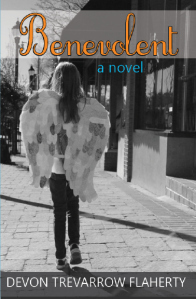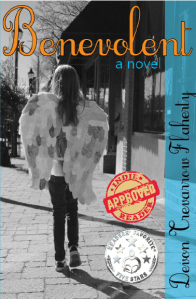Devon Trevarrow Flaherty's Blog, page 71
April 28, 2014
Series Review: The Sisters Grimm
The 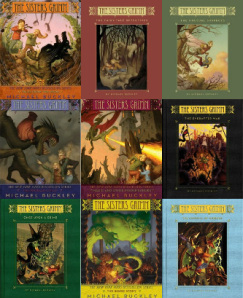 Sisters Grimm series by Michael Buckley, published from 20015-2012 by Amulet Books and illustrated by Peter Ferguson.
Sisters Grimm series by Michael Buckley, published from 20015-2012 by Amulet Books and illustrated by Peter Ferguson.
The entire award-winning, New York Times Best-selling series:
The Fairy-Tale Detectives
The Unusual Suspects
The Problem Child
Once Upon a Crime
Magic and Other Misdemeanors
Tales From the Hood
The Everafter War
The Inside Story
The Council of Mirrors
My nine year old (since she was eight) is in love with these books. She is now reading Harry Potter, has enjoyed the Chronicles of Narnia and American Girls, but these are by far her favorite. Now, looking back on my own childhood reading choices (among my love for Madeleine L’Engle and The Wheel on the School stood my imposing thirst for The Babysitters’ Club), I realize that children can be a terrible gauge for literature, unless you are measuring profitability or popularity. In that case, my daughter has fallen in to line. These books are both popular and profitable and she has both fingers crossed waiting for a movie deal.
And here is the caveat: not spectacular writing. For an adult looking at the series (or even a pretty smart kid), the similes are broken, the plot is often obvious, the style mediocre (and roughly borrowed from Lemony Snickett), the characters sometimes flat (not to mention cliche)… It’s just not great. It’s not terrible, either. From a nine-year-old girl’s perspective, though, I imagine it is the fun swirling of all the familiar fairy tales and stories together and also the (mostly) compelling plot. And I have to admit, the series bettered as it went, and Puck made me LOL. You’ve got romance, you’ve got danger, you’ve got family… All mashed together with this popular kids’ black humor thing.
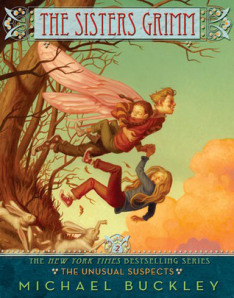 And you’ve got a seven and twelve year old? The youngest, especially, was distractingly young for the plot. Every time Buckley reminded me of her pigtails and overalls I felt lost. It’s fantasy, I know. For me, their ages just didn’t work, especially since the older one is hit with a pretty complicated, extended romance. Even Rowling waited until Harry was something like fifteen. And it forced a delayed ending, too (you know, “12 Years Later”), which was just a tad less than satisfying.
And you’ve got a seven and twelve year old? The youngest, especially, was distractingly young for the plot. Every time Buckley reminded me of her pigtails and overalls I felt lost. It’s fantasy, I know. For me, their ages just didn’t work, especially since the older one is hit with a pretty complicated, extended romance. Even Rowling waited until Harry was something like fifteen. And it forced a delayed ending, too (you know, “12 Years Later”), which was just a tad less than satisfying.
Plus, I find the action and fight scenes (which are prolific) to be holey. It reminds me of the advice that when writing an action scene you pull your spouse and kids into the room and make them act it out. The Grimm series is fond of creating these mental chasms in the otherwise fast-moving action scenes, and I as a reader slipped a gear in my interest-traction. Now, how could she hit HIM if she was just over there?!? Careful, there, writers.
My only other negative thing to say: the series gets suddenly witchy in the last book. I mean, like flesh-eating and frog innards and covens and whatnot. (And these are the good guys.) I guess you might see it coming, but considering that it wasn’t there before book Nine makes me want to warn you especially. If you have issues with witches and the occult over that fine line of fantasy, you’re going to be really disturbed in the last book.
I would recommend these books, with the last caveat I gave above. Of course, for kids and preteens, especially girls, but also for adults who enjoy Middle Grades fiction and want an easy, enjoyable read. Like maybe for a trip, especially to the beach. Some of the characters do fill out more as the series continues. It grows up a little, becomes more complex. And what is at first slightly unimpressive becomes reader-candy, increasingly hard to put down.


April 24, 2014
Book Review: Parade’s End
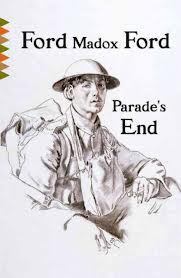 Parade’s End, by Ford Madox Ford. First published as a series of books, Some Do Not…, No More Parades, A Man Could Stand Up–, and The Last Post, in the 1920s. I read the Vintage edition of all four stories together, published in 1950/1978.
Parade’s End, by Ford Madox Ford. First published as a series of books, Some Do Not…, No More Parades, A Man Could Stand Up–, and The Last Post, in the 1920s. I read the Vintage edition of all four stories together, published in 1950/1978.
All authors have their overused words. For Rowling in the Potter series, it was “pant.” For Rowling later on, it was all about “thick legs.” For me, it seems to be “face” or “gaze.” For Tolstoy, it was “superfluous” (at least in translation). And for Ford, well, he has a number of them, which at times he is doing on purpose. The worst one, by far, is “lachrymose.” If I have to read “lachrymose” one more time…
This book is a tetralogy. Ford, in fact, never saw it as the omnibus Parade’s End, even though he suggested the title. However, when Graham Greene did a release of it many years ago, he left off the last book, saying that Ford himself wrote The Last Post superfluously (tee hee) and that he later regretted its inclusion. I was, therefore, torn between reading it as a trilogy or in its entirety. It helped that I had a terrible time getting through it at all. I left it at the trilogy. Many Parade fans would be appalled, for even though the last book is supposedly very different, it does have its proponents. Okay, I’ll admit, I skimmed it, and nothing called out to me.
This is another one of those books listed without fail in the top one hundred best books, wherever you might find that list. It has been called the greatest war novel(s) of all time, as well as the best of the 20th century. It does not have the large base of obsessive followers as many of the other chart-toppers (Anna Karenina, The Great Gatsby, Don Quixote, etc.), and it is clear why. It is a difficult read. Or, in the words of some article I read months ago and can not now find, it is a dying novel. Sure, it has themes and stories that could transcend, but its language and literary devices are wearing thin.
The writing style is somewhere between stream-of-consciousness and chunky time jumps (backwards and forwards). Ford’s writing is replete with repeated words and phrases, amazingly sustained run-on sentences, and ellipses. (If ellipses vex you, I beg you not to pick up this book.) Particular moments in time are relived again and again, the whole 730 dense pages adding up to maybe a total of ten actual scenes. Points are driven into the reader’s head until it’s simply buzzing. I believe all of this comes from the stream-of-consciousness thing, and it’s a style I have a very hard time enjoying. Perhaps it’s because I don’t think in meandering tirades of words. I think in pictures. Meandering, messy, repetitive tirades of words are tiresome to me.
And yet I can appreciate many things about this novel(s). You are really able to get in to a couple of the character’s heads. The characters, in general, are extremely finely drawn. So is leftover Victorian England. So is war, or at least WWI. You’ve got this great love triangle, and an exploration of fresh topics, like one’s upbringing and theories versus their passion and circumstances. And Sylivia? She’s just one big train wreck of a personality disorder, and I heartily enjoyed reading her on tenterhooks.
But I found myself wishing, very frequently, that Ford’s writing style had been very, very different. I appreciate his care and perspective; I can’t tolerate his voice. I want to play editor, and demand that he cut the whole thing by at least half, re-order it into sequential events, and flesh out a few of the supporting characters and subplots. Plus, give us more action! Then, I’m afraid, the whole thing would be dead, a mangled, lifeless thing, the harrowing tension gone. Which is what the book is, really: a very tight winding in the distinct voice of the times.
Not a re-read for me. Can’t say I regret having read it. It took me forever. If I was forced to choose one to re-read, it would definitely be A Man Could Stand Up–, which has some achingly beautiful language and moments.
__________
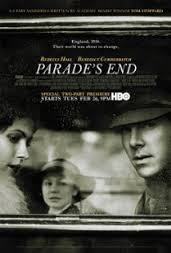 I had decided to move this book up on my queue when I saw that the new British TV series was written by Tom Stoppard. (For Stoppard reviews, see here and here.) Of course, Cumberbatch fever helped.
I had decided to move this book up on my queue when I saw that the new British TV series was written by Tom Stoppard. (For Stoppard reviews, see here and here.) Of course, Cumberbatch fever helped.
I ended up watching the whole five-part series while I was on a break from reading the novel, which has confused me considerably. From what I can recall, the series is a great representation of the novel(s). It has that sort of fractured, in-his-head, finely-drawn characters feel, and it covers just about all the scenes, at least in the middle two books. There were some plot changes that I am not sure about. It could have been that I misunderstood something. It could have been that not reading the last book put me at a disadvantage. It could have been Stoppard added things for translation into movie. Plus, for a book which gathers most of its sexual steam by being definitively demure, the series was a bit too overtly sexy for itself.
Otherwise, fans of British TV and/or Cumberbatch will be happy with this series. It is true, as has been widely said, that he does a great job acting, as does Rebecca Hall. I can imagine these were two of the most difficult characters to play, of all time, which may be why Parade’s End doesn’t seem to have hit the big or small screen until now. Beautiful cinematography, fun costumes. Enjoyable, at the very least, for anyone who tolerates period films.
__________
“…the oddnesses of friendships are a frequent guarantee of their lasting texture” (p5).
“Such calamities are the will of God. A gentleman accepts them” (p12).
“Disasters come to men through drink, gambling, and women” (p14).
“…you live beside a man and notice his changes very little” (p17).
“Damn it. What’s the sense of all these attempts to justify fornication?” (p18).
“It’s the tradition, so it’s right” (p18).
(About England:) “We’re always, as it were, committing adultery–like your fellow–with the name of Heaven on our lips” (p21).
“The gods to each ascribe a differing lot: / Some enter at the portal. Some do not!” (p24).
“But Sister Mary of the Cross at the convent had a maxim: ‘Wear velvet gloves in family life.’ We seem to be going at it with the gloves off” (p41).
“‘What’s to stop it?’ the priest asked. “‘What in the world but the grace of our blessed Lord, which he hasn’t got and doesn’t ask for?’” (p45).
“Cats and monkeys. Monkeys and cats. All humanity is there” (p85).
“‘It’s the person who does the thing he’s afraid of who’s the real hero, isn’t it?” (p88).
“I could harangue the whole crowd when I got them together. But speak to one man in cold blood I couldn’t’” (p89).
“In every man there are two minds that work side by side, the one checking the other; thus emotion stands against reason, intellect corrects passion…” (p93).
“Who knows what sins of his own are heavily punishable in the eyes of God, for God is just?” (p129).
“I shall write in my bedroom on my knee. I’m a woman and can. You’re a man and have to have a padded chair and sanctuary…” (p132).
“It was as if for a moment destiny, which usually let him creep past somehow, had looked at him” (p147).
“Obviously he might survive; but after that tremendous physical drilling what survived would not be himself, but a man with cleaned, sand-dried bones” (p200).
“If you hunch your shoulders too long against a storm your shoulders will grow bowed…” (p201).
“He considered that, with a third of his brain in action, he was over a match for Mark, but he was tired of discussions” (p216).
“This civilization had contrived a state of things in which leaves rotted by August. Well, it was doomed!” (p232).
“No! ‘Pasteurized’ was the word! Like dead milk. Robbed of their vitamins…” (p294).
“An enormous crashing sound said things of an intolerable intimacy to each of those men, and to all of them as a body” (p315).
“The distrust of the home Cabinet, felt by then by the greater part of that army, became like physical pain” (p320).
“‘If you let yourself go,’ Tietjens said, ‘you may let yourself go a tidy sight father than you want to’” (p325).
“He used the world hell as if he had first wrapped it in eau-de-Cologned cotton-wadding” (p348).
“‘Don’t think I’m insulting you. You appear to be a very decent fellow. But very decent fellows have gone absent’” (p364).
“The man looked you straight in the eyes. But a strong passion, like that for escape–or a girl–will give you control over the muscles” (p364).
“English people of good passion consider that the basis of all marital unions or disunions, is the maxim: No scenes” (p368).
“He would, literally, rather be dead than an open book” (p368).
“…she had seemed a mere white phosphorescence…” (p370).
“You cannot force your mind to a deliberate, consecutive recollection” (p371).
“My wife must have been more aware of my feelings for Miss Wannop than was I myself” (p373).
“Obviously he was not immune from the seven deadly sins” (p377).
“One reserved the right so to do and to take the consequences” (p377).
“That whole land was to be annihilated as a sacrifice to one vanity” (p386).
“The world was foundering” (p387).
“But it’s better to go to heaven with your skin shining and master of your limbs” (p390).
“…he might be just in time for the last train to the old heaven…” (p394).
“The French were as a rule more gloomy than men and women are expected to be” (p437).
“You cannot keep up fits of emotion by the hour” (p436).
“They wanted the war won by men who would at the end be either humiliated or dead. Or both. Except, naturally, their own cousins or fiancee’s relatives” (p533).
“…the telephone began, for Valentine, to assume an aspect that, years ago it had used to have–of being part of the supernatural paraphernalia of inscrutable Destiny” (p543).
“…flee away and eat pomegranates beside an infinite washtub of Reckitt’s blue” (p546).
“You had to keep them–the Girls, the Populace, everybody!–in hand now, for once you let go there was no knowing where They, like waters parted from the seas, mightn’t carry You” (p551).
“To save three thousand, two hundred pounds, not to mention interest–which was what Vincent owed him!–Edith Ethel with the sweetest possible smile would beg the pillows off a whole hospital ward full of dying …. She was quite right. She had to save her man. You go to any depths of ignominy to save your man” (p570).
“‘I didn’t consciously want to bother you but a spirit in my feel has made me who knows how …. That’s Shelley, isn’t it?” (p571).
“Then… What should keep them apart? …. Middle Class Morality? A pretty gory carnival that had been for the last four years!” (p576).
“If people wanted your to appreciate items of sledge-hammering news they should not use long sentences” (p578).
“Thoughts menaced him as clouds threaten the heads of mountains” (p588).
“Probably because they–the painters–drew from living models or had ideas as to the human form …. But these were not limbs, muscles, torsi. Collections of tubular shapes in field-grey or mud-colour they were. Chucked about by Almighty God? As if He had dropped them from on high to make them flatten into the earth” (p594).
“How the devil had that fellow managed to get smashed into that shape? It was improbable” (p597).
“In the trench you could see nothing and noise rushed like black angels gone mad; solid noise that swept you off your feet …. Swept your brain off its feet” (p602).
“You imagined that the heavenly powers in decency suspended their activities at such moments. But there was positively lightning. They didn’t!” (p603).
“It appeared to him queer that they should be behaving like that when you could hear… oh, say, the winds of the angel of death ….” (p622).
“But Great General Staff likes to exchange these witticisms in iron. And a little blood!” (p655).


April 21, 2014
Tenacious Dee
In the writing world, much of our advice becomes trite. Partly, I think, this is because it is true and therefore gets batted around so much it becomes tattered and, at times, useless. For example, my last post was about Write what you know. I have the feeling I could have written the first two words of that phrase with an ellipses and you could have filled in the blank. Hey! For fun, let’s try that with a few more pieces of writerly advice.
Kill your…
When someone tells you something is wrong…
Read a lot and…
Quantity produces…
Open with a…
Show,…
Skip the…
Keep…
Never…
The answers, or course: darlings; they are almost always right; write a lot; quality; bang; don’t tell; boring parts; writing; give up.
Now, the advice that I have on my mind today, which I often have on my mind, is part and parcel with the last two pieces of advice above. Keep writing. Never give up. Because as trite as it is, it is true that writers have a super-long-haul kind of job with very few markers to let them know they are headed in the right direction. Writers have to put word after word after word on the page, day after day, then keep those words building toward one big end, then try to act sane while their already-published books languish. Sometimes this process, before some sort of break, can last many, many years.
When I was a kid, my dad built me a loft for my bed. It had to be almost six feet tall, pretty close to the ceiling. It had a rail along the edge to keep me from falling out. (Thanks, Dad.) When I was a kid, I was also obsessed with flying. Not in a plane, no, but just me and the wind and perhaps a pair of giant wings. To this day, I want to go skydiving and learn to pilot a plane, but what I secretly want is to take off from the ground and shoot straight up at the birds.
When I was around eight years old, I woke up every morning and thought to myself, Today is the day. Then I would sit on the railing of my bed, concentrate really hard visualizing myself swooping down the hall and out the front door, and then I would jump. I can still remember the surge of hope rising up inside my chest, and the immense let down when my feet hit the ground.
The next day? All over again. And the next and the next and the next. Always the same.
When re-telling this story to my kids the other day, I paused and said, “And that, my friends, is the type of person who becomes a writer.” Because–saying the trite in yet one more way–writing takes guts and lots of them, but it also takes immense and illogically repetitive hope. Or in the words of Dorothy Parker, “If you have any young friends who aspire to become writers, the second greatest favor you can do them is to present them with copies of The Elements of Style. The first greatest, of course, is to shoot them now, while they’re happy.” It won’t be easy. It won’t be quick.
I am a person who still believes, after all the knocks and rejection and disappoints, that I can write something great, that people will eat it up, that I will be rich and famous and sell a billion books. It may be ridiculously stubborn. It may, indeed, make me certifiable. But it is what brings me back to the computer every day when I have made negative $100 for the month of April. I believe I can fly, and it will be today.
And I’m also laughably imaginative.


April 17, 2014
How To Write What You Don’t Know
How many times does an individual writer hear, “Write what you know.” And conversely, if you write something–even completely fictional–and write it well, you get “When did you do that?” or even the dubious, “How could you have written that?” Look at the hubbub surrounding Wally Lamb’s She’s Come Undone (a painfully intimate account from the perspective of an overweight young woman). My recent review of Leo Tolstoy’s Anna Karenina remarks on his impossible ability to write from so many perspectives which I know he could not have lived, including the Kitty post-labor scenes.
During Camp NaNoWriMo, one of my cabinmates (a young writer, I might point out) shared a problem. She needed to write a kissing scene, but had no experience with kissing. I have to admit, when I first read the request for input, I had the knee-jerk reaction of, “Well, then you can’t write it.” But it took about five seconds of thinking before I realized that writers write every day and all the time about things of which they have little to no experience. It’s called fiction. And really, its what makes many great writers great; their ability to write empathetically when they have no business empathizing. Sure, as I said to her, first-hand experiences can make for wonderful, authentic writing. I suppose this is why we advise early writers to “Write what you know.” But from there, the world is our oyster.
So here is the breakdown of how to write what you do not know (which by the way, I highly recommend for both pleasure and craft):
If it is possible and beneficial, experience the thing. Travel is a great example. If you want to write about Ireland, go spend some time in Ireland and your writing will ring much truer. Keep notes, a diary, a journal. Experience deeply and fully and widely. To be honest, you only need a small range of experience at something to lend realism to your writing. Then, run the final product by someone who knows.
If it is not possible or beneficial (and much of the time it is not), read about it or watch a movie about it. Actually, read a lot about it or watch several movies or shows about it. Many writers can dive head-first into genre writing if they have read enough of it, because many writers are intuitive thinkers and absorb that sort of stuff like a sponge. Again, maybe you want to run it by someone who knows first-hand, just so you don’t come across too cliche or embarrass yourself.
Third, turn to your imagination. Say what? That’s right. Sit back, close your eyes, and imagine you are kissing a boy or embroidering or brushing long hair. Then ask yourself what each of your senses is telling you. What do you see? What do you smell? What do you hear? What do you feel (tactilely)? What do you taste? What are you thinking about? What memory comes to mind? Tap into the possibility that you have experienced those same universal things, both emotionally and physically, just in different contexts. Armed with those imaginary things, you can write quite a dilly of a whopper.
And when all else fails, make crap up. So maybe you don’t know what it’s like to grow up in the 70s in Connecticut. So make up a town, leave the time vague. If you think that’s the feel you are going for, let fiction be fiction. No one can argue with a town called Frumptious during the Jallymoo period, cause nobody’s been there, seen that, done that. And let’s not forget, that sometimes its the made-up stuff that really gets to the truth of the matter, anyways. Isn’t that why we fell in love with fiction in the first place?
So, trust your instincts as a writer. Always walk into a scene in your mind and explore all the senses, then tell them to us. And let beta readers tell you if something rings false. Fiction is fiction so that we, the spinner of stories, can be freed up to cut to the quick by whatever means available.


April 14, 2014
Book Review: The Writer’s Journey
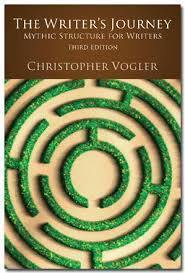 The Writer’s Journey: Mythic Structure for Writers, third edition. Written by Christopher Vogler and based on the works of Joseph Campbell. Third edition published in 2007 by Sheridan Books.
The Writer’s Journey: Mythic Structure for Writers, third edition. Written by Christopher Vogler and based on the works of Joseph Campbell. Third edition published in 2007 by Sheridan Books.
I read this book for work. I am a novelist, so I had to self-edit as I went, since it is written with a strong bent toward screenwriters. I was taking extensive notes, since I was planning on using the Hero’s Journey model for an upcoming project. Let’s just put it this way: I wouldn’t un-read the book, I need the information I gleaned and am thankful for it. On the other hand, it was quite dry. It read much more like a manual than a novel. Since it is more of the first than the second, I can’t really fault Vogler, but I would have loved some snazz.
So what is the Hero’s Journey, and where did this book come from?
The Hero’s Journey is a concept first pioneered by Joseph Campbell in his book The Hero With a Thousand Faces, in the 1940s. The idea is that most–if not all–stories have a discernible pattern in common (and that pattern comes from ingrained human psychoses, heavily leaning on Jung’s interpretation of it (and Freud?)). From ancient myths to modern movies, great stories–stories that resonate with people–have a number of components, structure and stages, in common. There are seventeen stages in Campbell’s Heros Journey (also called a Monomyth), and not all of them are present in every story. Campbell’s ideas have been both expanded and refined since his presentation of them, and became very popular in the 1980s and 1990s.
 Among such adherents and fans (like Bob Dylan and Geroge Lucas) was a man named Christopher Vogler. He had been working as a film producer and writer when he released a memo for Disney workers called “A Practical Guide to the Hero’s Journey.” This memo was based on studies of Campbell and the Monomyth and it so changed Vogler’s life, his approach to writing, and possibly even the industry, that he expanded it considerably in the first edition of A Writer’s Journey. He became a Campbell proponent, a lecturer, and a screenwriting story consultant supreme, causing a further movement in the Hero’s Journey’s own story arch.
Among such adherents and fans (like Bob Dylan and Geroge Lucas) was a man named Christopher Vogler. He had been working as a film producer and writer when he released a memo for Disney workers called “A Practical Guide to the Hero’s Journey.” This memo was based on studies of Campbell and the Monomyth and it so changed Vogler’s life, his approach to writing, and possibly even the industry, that he expanded it considerably in the first edition of A Writer’s Journey. He became a Campbell proponent, a lecturer, and a screenwriting story consultant supreme, causing a further movement in the Hero’s Journey’s own story arch.
I can’t tell you much more about Campbell’s Monomyth, but I can lay out the stages and archetypes according to Vogler. And they are: ACT ONE: Ordinary World; Call to Adventure; Refusal of the Call; Meeting the Mentor; the First Threshold; ACT TWO: Test, Allies and Enemies; Approach to the Inmost Cave; the Supreme Ordeal; the Reward; ACT THREE: the Road Back; Resurrection; and Return with the Elixir. The main archetypes are the Hero, Mentor, Threshold Guardian, Herald, Shapeshifter, Shadow, Ally, and Trickster. Vogler takes a loose approach to the whole thing, saying that stages can be moved around and archetypes can be combined or split. Gender is not set, although historically the hero and mentor have been male, the shapeshifter female. Vogler encourages the writer to play with the forms, but to keep in mind that all great stories have these things in common. I appreciate his practical approach to everything: Does it work? Great.
Vogler also embraces Campbell’s views that the Monomyth arises from the human psyche. He goes a step further, in fact, asserting that the Hero’s Journey can be used to navigate our real lives and real emotions and motives. His book is mainly a primer on the stages and archetypes of the Hero’s Journey, fleshed out and with examples. In the epilogue, Vogler also addresses such issues as the role of the reader in the interpretation of story, polarity as a theme, catharsis as a concept and a necessity, and trusting the journey of writing.
 If you are a writer of any sort, this is the kind of book that if you haven’t read it already, you will want to get your hands on it. Not only are you going to look completely out of it if it comes up at your next cocktail party, but it can work for you. Vogler doesn’t suggest–just the opposite actually–that you simply plug stuff in to a Vogleresque structure. He wants to make you aware, as a writer, of what a story is–has always been–about, and how structure, plot, and characters are part of that heart-stirring, life-changing process. Especially for writers in crisis (which happens to all of us at least a few times, right?), this book could be instrumental in getting yourself out of a pickle, let alone changing the way you approach your own process.
If you are a writer of any sort, this is the kind of book that if you haven’t read it already, you will want to get your hands on it. Not only are you going to look completely out of it if it comes up at your next cocktail party, but it can work for you. Vogler doesn’t suggest–just the opposite actually–that you simply plug stuff in to a Vogleresque structure. He wants to make you aware, as a writer, of what a story is–has always been–about, and how structure, plot, and characters are part of that heart-stirring, life-changing process. Especially for writers in crisis (which happens to all of us at least a few times, right?), this book could be instrumental in getting yourself out of a pickle, let alone changing the way you approach your own process.
If you are a leftist feminist or a generally angry person, you might disagree. (See “Criticism” section of Wikipedia’s article on Monomyth for some fodder.) I’ve never had a problem with generalizations as long as we don’t consider them absolutes. I admire–and participate in–anecdotal observation to make sense of things. I didn’t exactly swallow the whole psychobabble pill, but I certainty didn’t find it offensive. I would love for storytelling to continue to evolve and come up with wonderfully fresh material and yet I strongly believe that there is nothing new under the sun. Why not acknowledge our common threads while addressing the world from the stage of novel writing?
Visit Christopher Vogler’s website here.
I also loved the illustrations. And can’t believe I didn’t mention Star Wars once in the review.
__________
“The structure should not call attention to itself, nor should it be followed too precisely” (p19).
“These wounds of rejection, betrayal, or disappointment are personal echoes of a universal pain that everyone has suffered from: the pain of the child’s physical and emotional separation from its mother. In a larger sense, we all bear the wound of separation from God or the womb of existence–that place from which we are born and to which we will return when we die” (p93).
“Hundreds of writers have told me they plotted their screenplays, romance novels, or TV sitcom episodes using the Hero’s Journey and the guidance of mythology” (p233).
“These archetypal patterns turn a chaotic event like the sinking of an ocean liner into a coherent design that asks questions and provides opinions about how life should be lived” (p237).
“The Ship of Fools is an allegory, a story in which all the conditions of life and levels of society are lampooned savagely in the situation of a boatfull of pathetic passengers. It is a sardonic tale, harshly depicting the flaws in the people and social systems of its time” (p248).


April 9, 2014
Book Review: A Night to Remember
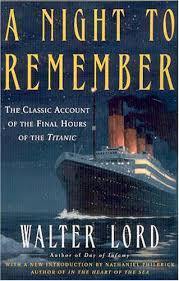 A Night to Remember, by Walter Lord, was published in the 1950s but reissued by Holt Paperbacks in 1994.
A Night to Remember, by Walter Lord, was published in the 1950s but reissued by Holt Paperbacks in 1994.
This book is not on my compiled list of best books of the world (which lists more than 1200 titles). However, it is a sort of classic, and my daughter picked it out of a lineup for her third grade nonfiction book report. She’s not too happy that she did: I read it out loud to her and she synopsized in her report, “I would give this book one star out of five because I didn’t enjoy it. It was boring. It was very detailed and was hard to pay attention to. It said on the website that it was for teenagers and grown-ups, but I thought I would like it anyways. I was wrong, but I did learn a lot about the Titanic.”
I, on the other hand, did enjoy it. It is chock-full of details and ship vernacular; just name after name and timelines and maps and temperatures and all that. Still, the book is such a fascinating study of people in crisis and also of an era gone by, and does the whole thing with kid gloves, compassion, and panache. I was riveted to all those details, and was moved to tears almost every night we read it. (Try explaining to your kids that a simple sentence of factual information can recreate a heart-wrenching scene in your mind of a father sending his family away knowing he will never join them and that this scene makes you imagine your own husband on the deck waving goodbye to you and them; they just look at you like you are nuts.)
I’m not sure I have much more to say about this book because it is all there in that last paragraph. Lots of deets, but heart-breaking stories and fascinating information and a time of glamor and pride and self-righteousness that was never quite to be again. Plus, there’s a character named Major Butt and plenty about the poop deck. My kids did enjoy that.
Haven’t enjoyed a nonfiction book this much since Columbine by Dave Cullen.
__________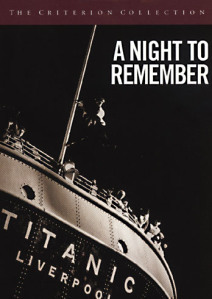
There is also a rather lauded old movie based on this book, and no I don’t mean Titanic. Titanic is too riske for my kids to watch and I’m pretty sure one hundred per cent of you have watched that one already, but I have put A Night to Remember on hold with Netflix, and I will review it once we watch it.


April 7, 2014
Month Recap: March On
April, as you probably already know, marks the first Camp NaNoWriMo for the 2014 calendar year. Camp will repeat in July (no word yet as to whether or not I will be joining in) and the classic NaNoWriMo will take place, as always-always, in November. I write this March recap from one week into April, and I am happy to say that this time I am keeping pace. In fact, after a rough two days, I actually beat my words written in one day personal best, with 4,000. I will update you further once the whole fiasco is over and The Journey of Clement Fancywater is 50,000 words heavier.
I have set aside The Family Elephant’s Jewels–at half-written–because I simply can not write thousands of words a day on two different books. It would muddy my mind-space. I have also set aside The Night of One Hundred Thieves, at least mostly, while I let some first readers catch up to me in the editing process. They say its best to let a book mellow here and there, anyhow. Consider it mellowing until April is over. Then, the priority will be: update Benevolent cover; The Journey of Clement Fancywater finished; Night of One Hundred Thieves published; The Family Elephant’s Jewels finished and edited; and The Journey of Clement Fancywater edited. Is there a problem with three titles all beginning with “the?”
I spent most of March preparing for Camp NaNoWriMo. I wrote detailed notes about the plot, characters, and setting, did a ton of thinking and even brainstorming with my husband, and read The Writer’s Journey. Watch later this week for the review of that book.
Otherwise, I am still stuck reading Parade’s End by Ford Maddox Ford. I am nearing the end of book two, but still have a third (!!). I have been distracted by reading for work and with the kids, sure, but I am also just finding Parade’s End a very difficult read. Look for that review, hopefully, before the end of the month.
Thanks for listening.


Month Recap: March
April, as you probably already know, marks the first Camp NaNoWriMo for the 2014 calendar year. Camp will repeat in July (no word yet as to whether or not I will be joining in) and the classic NaNoWriMo will take place, as always-always, in November. I write this March recap from one week into April, and I am happy to say that this time I am keeping pace. In fact, after a rough two days, I actually beat my words written in one day personal best, with 4,000. I will update you further once the whole fiasco is over and The Journey of Clement Fancywater is 50,000 words heavier.
I have set aside The Family Elephant’s Jewels–at half-written–because I simply can not write thousands of words a day on two different books. It would muddy my mind-space. I have also set aside The Night of One Hundred Thieves, at least mostly, while I let some first readers catch up to me in the editing process. They say its best to let a book mellow here and there, anyhow. Consider it mellowing until April is over. Then, the priority will be: update Benevolent cover; The Journey of Clement Fancywater finished; Night of One Hundred Thieves published; The Family Elephant’s Jewels finished and edited; and The Journey of Clement Fancywater edited. Is there a problem with three titles all beginning with “the?”
I spent most of March preparing for Camp NaNoWriMo. I wrote detailed notes about the plot, characters, and setting, did a ton of thinking and even brainstorming with my husband, and read The Writer’s Journey. Watch later this week for the review of that book.
Otherwise, I am still stuck reading Parade’s End by Ford Maddox Ford. I am nearing the end of book two, but still have a third (!!). I have been distracted by reading for work and with the kids, sure, but I am also just finding Parade’s End a very difficult read. Look for that review, hopefully, before the end of the month.
Thanks for listening.


March 31, 2014
Goin’ Campin’
If you have been around this blog, long, you witnessed my first attempt at NaNoWriMo (National Novel Writing Month), last November. (For the journey, see here.) If you haven’t, I’ll just explain that NaNoWriMo happens each November, and tens of thousands of writers and would-be-writers sign up to pound out 50,000 words during the thirty-one days. Even though I was unable to complete my task (due to a physical injury and poor planning), I enjoyed the experience and got a new book out of it (The Night of One Hundred Thieves, out later this year). In fact, the process of a quick write was so agreeable to me, that I want to try it again and I don’t want to wait until November.
Enter Camp NaNoWriMo.
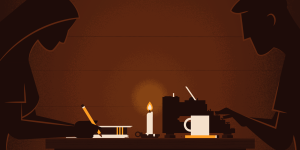
Camp NaNoWriMo is a little bit NaNoWriMo light, but it also embraces things that NaNoWriMo doesn’t: younger participants, alternative projects, and varying word count goals. (Note: part of me is really tempted to up the word count goal since my book is definitely going to be longer than 50,000, but that would be stupid since I didn’t even make that goal, last time.) Another cool thing: you can be put into virtual cabins with other participants, which will (theoretically) act as encouragement and friendly competition. You not only chat with these people on the website, but can view their daily progress alongside your own.
I am also happy to announce that I got a friend of mine to participate with me. I am looking forward to cracking the whip on her. Just kidding. (Maybe.)
More deets: Camp NaNoWriMo happens twice each summer, and the months for 2014 are April and July. You have the month to complete your word count goal (while juggling normal life). Most novice participants would advise the newbie to plan really well, which I have been working on all this past month. I have pages of printouts, a giant file of notes, and hours of logged brain time devoted to The Journey of Clement Fancywater, but no words on the page, yet. To see more about Camp NaNoWriMo (or to join in), go here. To read more about The Journey of Clement Fancywater, go here.
So here I go, again.
Tomorrow.


March 27, 2014
All Things Made New
Well, we have another battle of the covers.
I was updating the cover of Benevolent because I wanted to add a couple badges and update the copy on the back (with a review and some fresh perspective). With Amazon, this means that the book will be unavailable while it updates the file. So, since that has to happen anyhow, I thought I might further update the cover with a little more, well, oomph. I have been poring over this database of great covers (which I mentioned in the last blog), and have come up with some changes.
Do you think it is an improvement? What else would you change about it? Does the photo need to be stylized?
Thanks for your input, and happy covers to you, as well.



